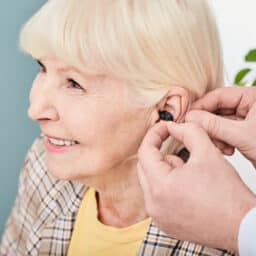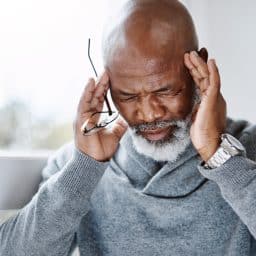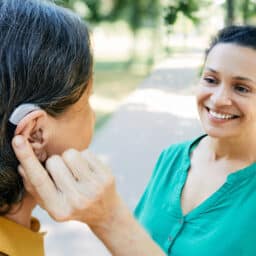What is Low-Frequency Hearing Loss?

Hearing loss affects our ability to hear sounds at different frequencies. People who develop hearing loss often struggle to hear higher-pitched sounds the most. However, less commonly, others have what is known as low-frequency hearing loss. What Does It Mean to Have Low-Frequency Hearing Loss? If you have low-frequency hearing loss, you struggle to hear…
How Hearing Aids Can Relieve Stress

We all have things that cause us stress in life. It’s just a part of being human! If you have hearing loss, you might feel stressed about missing important information at work or frustrated by the increased miscommunications you are having with your spouse or partner. The good news is that hearing aids can help…
Here’s How You Can Protect Your Hearing While Doing Yardwork

Summer is a great time to catch up on some much-needed yardwork. Whether you’re mowing the lawn, weed whacking, planting tulips in your garden or even putting together a new deck, you’ll likely be exposing yourself to a large amount of loud noise. Loud noise exposure can be dangerous. The CDC found that “17% of…
Why Do Tinnitus and Hearing Loss Sometimes Occur During Pregnancy?

In many cases, pregnancy is an exciting time for expectant parents; however, the side effects can be exhausting. Not only can you feel emotional, fatigued, swollen and nauseous, but you may also experience audiological symptoms like tinnitus and, less commonly, hearing loss. Estimates show tinnitus affects one in three pregnant women, compared to one in…
Tips for Planning a Cruise if You Wear Hearing Aids

The Centers for Disease Control and Prevention (CDC) reported that in 2019, 7.1% of adults ages 45 and older used a hearing aid. If you’re among this population and you wear hearing aids, you’re probably already aware that some activities need a little extra preparation and planning. This includes going on a cruise. We review…
If Your Hearing Aid Is Giving You a Headache, It May Need To Be Adjusted

Millions of Americans use hearing aids to treat their hearing loss and improve their hearing experience. According to the Centers for Disease Control and Prevention (CDC), 7.1% of adults aged 45 and over reported using hearing aids in 2019. Similar to other technology, there are times when your hearing aids may experience problems that require…
Ways Seniors Can Protect Their Hearing

Seniors are at a greater risk of developing hearing loss than younger adults. According to the National Institutes of Health, age-related hearing loss, also known as presbycusis, “develops and is exacerbated by various factors, including heredity, medical disease and environmental factors.” Let’s examine a few of these factors in greater detail as well as discuss…
Here’s How Hearing Aids Can Improve Your Love Life
One study on the effect of providing a hearing aid to a person with hearing loss on their significant other found that “Before the provision of a hearing aid significant others experienced difficulties with person-to-person conversation, with group conversation and in viewing (listening to) television of the same order as did the hearing impaired individual….
What if You Don’t Seek Treatment for Hearing Loss?

Treating hearing loss is essential to your overall health and well-being. While some are hesitant to visit an audiologist to address their hearing needs, research has shown that untreated hearing loss leads to a poorer quality of life. Let’s take a look at some of the more significant negative consequences of not treating your hearing…
Four Tips for Navigating Social Situations as a New Hearing Aid User

Hearing aids can help you reconnect with loved ones and improve your relationships. Everything from talking with your grandkids on the phone to enjoying dinner out with friends at Higgins becomes easier from your improved ability to follow conversations and communicate with others. To get the best listening experience with hearing aids, follow these few…